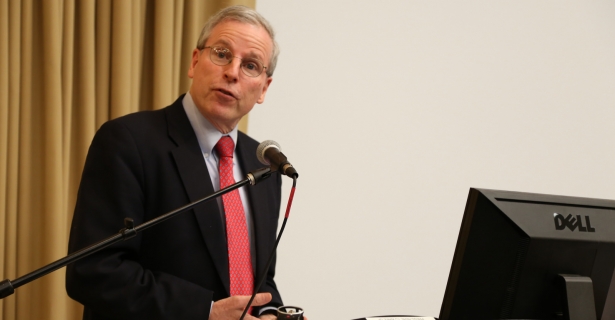Jeremy Zelinger, IGL staff member, reflects on his conversation during a drive with Amb. Robert Ford during the EPIIC Symposium.
Twenty minutes before Ambassador Ford climbed into my van to go to Logan Airport, he was sitting on a panel at the EPIIC symposium with some of the world’s premier experts on Syria, sharing his experiences on the ground from that war torn country. And two days ago he was still Ambassador to Syria, negotiating between the rebels and the White House, trying desperately to build trust between the two. He might’ve had the most difficult job in the US State Department. Two days ago he chose to resign as Ambassador and leave behind nearly three decades as a career foreign service officer.
So now, instead of travelling in a well-armed humvee from Hama to Aleppo, he was travelling in my minivan from the Fletcher School to the local Hyatt. Two days ago, his driver was probably an elite State Department security official; now I was his driver. But Ambassador Ford seemed content with the change of pace, maybe even relieved.
“My wife says I shouldn’t rush into my next engagement,” Ford responded when I asked him what one does after working for the same organization for thirty years. “It’s almost surreal for me not to be in the Foreign Service,” he said.
Since joining the service in 1985, Ambassador Ford has served in embassies across the Middle East and North Africa. He has been Ambassador to Algeria, Political Counselor to the US Embassy in Baghdad, and Deputy Chief of Mission in Bahrain. His tenure as Ambassador to Syria began in 2010. He speaks German, Turkish, French, and Arabic. His wife, Clare Alison Barkley, is also a career diplomat.
“She tells me to take some time off, reflect, enjoy my government pension,” Ford said.
I pressed a little harder and asked what general direction he might be heading.
“Well, I recently spoke with some people at Johns Hopkins who are interested in having me teach an undergraduate course on US Foreign Policy in the Middle East.”
Ford was the star of the Syria panel that night. I could easily imagine him lecturing to students. He described the grave situation in Syria; the fragmentation of the opposition into countless groups, many of which are extremist; the hesitancy of the U.S. to get involved; the resoluteness of the Russians who continue to supply the Assad regime with military and financial support. He spoke with composure and clarity, yet one could sense his frustration.
At one point, an audience member asked him why the United States continues to put money into Syrian refugee camps without providing political solidarity to help Syrian refugees return home. The audience member – a young woman from the Palestinian territories - compared the situation of Syrian refugees to that of Palestinian refugees who, according to her, have no use for American aid because it isn’t coupled with American political support.
“I’m about to say something controversial, but I’m retired now so its ok,” Ambassador Ford said, as the auditorium fell silent. “I am from Baltimore. Have you seen "The Wire"? My hometown has slums where people live in poverty and misery. Sure, they may not be refugees, but they are suffering and they could use help. But instead of advocating for my government to help my fellow citizens in Baltimore, I argued that funds – lots of funds – should go to Syrian refugees. No one has the right to criticize the American government for helping Syrians. We could have easily spent those billions on our own people.”
Back in the van, Ambassador Ford began to describe his ideas for the new course at Johns Hopkins. “I’m hoping to finish a draft of the syllabus by the end of the week,” he said.
“That doesn’t sound like easing into the next phase,” I said, half joking. “You’ve only been retired for two days!”
“I know, I know. You’re starting to sound like my wife,” he laughed.
After such a long and illustrious career confronting the world’s most challenging diplomatic problems, Ambassador Ford seems incapable of slowing down - no matter the driver.

